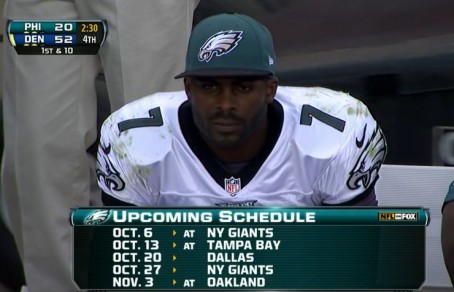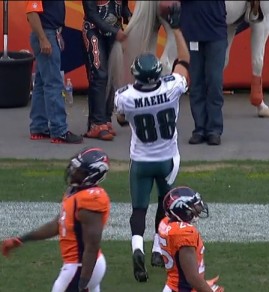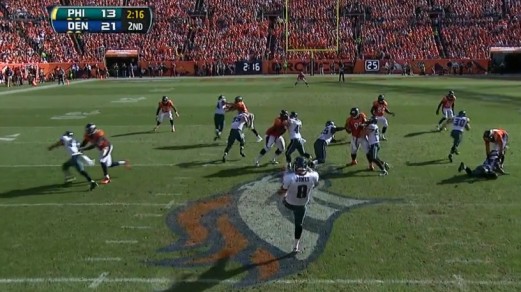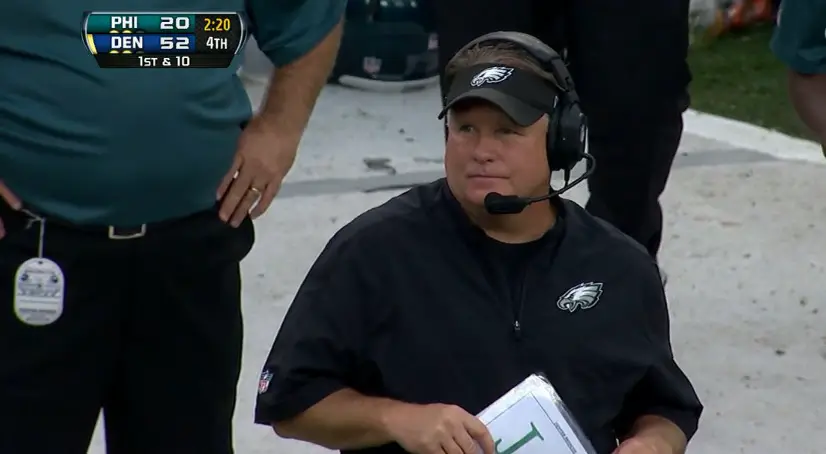from Video
Philadelphia hung in with Denver for a half, trailing only 21-13 at the break, before the Broncos did their best Oregon Ducks imitation — complete with TDs off of a kick return and a blocked punt — and ran up the final score to 52-20.
The Eagles are now 1-3 and, predictably, panic and terror have set in among fans and writers. Squawkers are complaining that Philly is cursed (huh?), that the team has no talent (untrue) and that the Iggles should make panicky acquisitions such as elderly safeties Jairus Byrd and Kerry Rhodes, or even failed Tampa Bay QB Josh Freeman (what?!). Dumbest of all, NFL “analyst” Gil Brandt predicted that Chip Kelly might pack it in after a year in Philly and take the suddenly vacant coaching job at USC.
No. Shut up. Get a hold of yourself. Take deep breaths.
The losses to San Diego and KC were frustrating because Philadelphia could have won them, but the preseason prediction for this team was good offense, bad defense and up-and-down year overall. That’s exactly what we have.
The 1-3 record so far has one major cause: the schedule. The Eagles lost to three teams with a combined record of 10-2. They now have the easiest remaining record in the NFL.

Michael Vick looks ahead to better times.
The next five games are against the New York Giants, the Tampa Bay Buccaneers, the Dallas Cowboys, the Giants again and the Oakland Raiders. The combined record of these opponents is 3-13, or 3-17, if you count the Giants twice. The only one with a winning record is the Cowboys, and Philadelphia matches up well with them. The Iggles will win three, four or even all five of those games, and Chip Kelly will once again become “a genius.”
Consider this: Dallas plays Denver this week, and the Broncos are 8-1/2 point favorites. If Denver wins and the Eagles beat the 0-4 Giants, then Philadelphia will lead the NFC East, with a 2-3 record and four consecutive easy games ahead. (I consider this a bit of a trap game, though, as the Giants are playing below their ability and have the home field advantage. If Philly loses, then serious panic will set in.)
So, smoothing out these scheduling effects, how do the Eagles stack up?
Under-Appreciated Strengths:
The Eagles have the seventh-best offense in NFL history, after four games, by yardage. They are clearly getting the most out of their three offensive stars (Vick, DeSean and LeSean). They didn’t give up a single turnover in the Broncos game, though I consider a blocked punt pretty damn close. Connor Barwin has been very solid at outside linebacker, and second-year running back Chris Polk looked strong against Denver. He scored a touchdown on his first-ever offensive snap. Heck, Jeff Maehl scored a touchdown and picked up a 37-yard reception to boot. Also encouraging, as Coach Kelly noted, is the fact that safety Nate Allen was rock solid in Games 3 and 4, as was offensive guard Todd Herremans against Denver. Both were conspicuous weaknesses for the Eagles in previous games.

The Maehl man delivers (to a new address).
Serious Concerns:
The defense. All of it. As Jimmy Kempski thoroughly documents, it may be the worst ever. In all of NFL history. (The Eagles’ strong opponents exaggerate these “on pace to” numbers, though.) The Eagles put little pressure on Peyton Manning, yet their pass coverage wasn’t any good either. (Source: 52 points.)
Special teams, strong in the first two games, have crumbled since then. STs gave up two TDs in Game 4 on a kick return and a blocked-punt runback, while doing little to help the offense. Returns were unimpressive, often behind the 25-yard line you get for free with a touchback, and Alex Henery missed a 40-something-yard field goal for the third straight game.
On the other side of the ball, the offensive line has deteriorated in the last two games (despite Herremans’ improvement), and red zone efficiency has been poor (27th in the league, to be exact), wasting all that yardage the team picks up. Celek dropped a perfect throw at the five in Denver, and Vick is 3-for-15 passing inside the 20.
The run still does well, though, even in the red zone — LeSean McCoy is 5-for-24, a 4.8 YPC average — which makes me wonder why Chip doesn’t run more inside the 20.
I wrote earlier about Kelly’s surprisingly conservative play calling, and other sportswriters picked up the cry after the Denver game. Not only is Chip reverting to typical NFL short passes, despite Philly’s lack of success with them, but in the Denver game he baffled everyone by punting on 4th-and-6 at the Denver 37, with just a couple of minutes left in the first half. It was bad enough that he had earlier kicked field goals on two different 4th-and-4s in the red zone, even though he admitted after the game that you can’t trade threes for sevens against Peyton Manning.

The lamest punt ever.
But punting from deep into Bronco’s territory was almost a parody of tightly wound NFL coaching. The TV announcers were debating field goal vs. going for it — they didn’t even consider the punt a possibility.
Chip blames the red zone woes (touchdowns on only 5 of 12 drives) on “self-inflicted wounds” such as penalties and drops, and those mistakes are definitely part of it. But his overly-cautious play-calling is another kind of self-inflicted wound. It’s not something he did at Oregon, and it sure looks like his football programs do better with the aggressive style that earned him the nickname “Big Balls Chip.”
On the seven red zone trips where Philly did not score a touchdown, Chip attempted a field goal on six (making five). It’s not simply that scoring touchdowns at least 50% of the time earns you more points overall. The gutsy calls build momentum and change the attitude of your players. When players know that you can always kick it, they lose urgency inside the 20.
How much did the 17 yards that Philadelphia gained by punting from the 37-yard line help? In fairness to Chip, the Eagles played tough D after the punt, got a penalty and a sack, and prevented Denver from getting even a field goal. It may have even been a small tactical advantage, if you assumed your offense was going to fail, but it was a strategic surrender. Denver was going to score and score again, eventually, but after this admission of weakness, the Eagles didn’t get another point until they were down by 39.
Right now, Chip Kelly has a lot of running room, with a five-year guaranteed contract and a consensus understanding that the team is rebuilding. Fans and writers know that. All they want is something exciting and new, even when it fails. Kelly was hired to be innovative and gutsy, the guy who favors science and bold innovation over tradition and carefulness. The only way he can really fail is to be boring and safe. Unfortunately, that’s starting to look like a real possibility.
Mark Saltveit’s best-selling book “The Tao of Chip Kelly” has received rave reviews from coaches, players and sportswriters since its release in June. You can find it at the Oregon Ducks Stores in Portland, Eugene and Bend, at Powells Books, at the Multnomah Athletic Club M-Porium in Portland, various bookstores in Pennsylvania and New Hampshire, and online at http://www.chipkelly.tv/
Related Articles:
Chip Kelly Update: Everything's Good Again ...
Chip Kelly Update: Wailing and Gnashing of Teeth
Shock and Awe -- The Oregon Ducks' Football Hangover Effect
Despite Lopsided Score, Georgia State "Never Stopped Believing"
Hope Springs Eternal for Ducks
Incompetent Pac-12 Officials: How Do You Miss ALL of THIS?
Mark Saltveit’s newest book is “Controlled Chaos: Chip Kelly’s Football Revolution” (Diversion Books, NY) has been recently released. He is the author of “The Tao of Chip Kelly” (2013) and writes on science, religion, wordplay and political scandals. He is also a standup comedian and the world palindrome champion.

